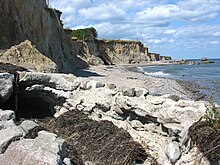HD 33564
HD 33564| 관찰 데이터 Epoch J2000 Equinox J2000 | |
|---|---|
| 콘스텔레이션 | 카멜로파르다리스 |
| 적경 | 05h 22m 33.5290s[1] |
| 적위 | +79° 13° 52.1427°[1] |
| 겉보기 등급(V) | 5.08[2] |
| 특성. | |
| 스펙트럼형 | F7V[3] |
| U-B 색지수 | −0.13 |
| B-V 색지수 | 0.506±0.002[2] |
| 아스트로메트리 | |
| 반지름 속도(Rv) | - 11.03±0[1].23km/s |
| 고유운동(μ) | - RA:78.386±0.224mas[1]/년 Dec.:162.165±0.296mas[1]/년 |
| 시차()) | 47.6977 ± 0.1680 mas[1] |
| 거리 | 68.4 ± 0.2 리 (20.97 ± 0.07 pc) |
| 절대 등급(MV) | 3.59[4] |
| 세부 사항 | |
| 덩어리 | 1.29[5] M☉ |
| 반지름 | 1.51+0.02 −0.06[1] R☉ |
| 광도 | 3.428±0.017[1] L☉ |
| 표면 중력(log g) | 4.22g[5] |
| 온도 | 6,396+135 −36[1] K |
| 금속성 [Fe/H] | 0.14덱스[5] |
| 회전 속도(v sin i) | 14.3[5] km/s |
| 나이 | 1.80[5] Gyr |
| 기타 명칭 | |
| 데이터베이스 참조 | |
| 심바디 | 데이터. |
HD 33564는 북쪽 카멜레오파다리스자리에 있는 외계 행성 동반성이 있는 단일[6] 별입니다.겉보기 등급은 5.08로 [2]맨눈으로 희미하게 보이는 5등급 별이다.이 계는 시차를 기준으로 태양으로부터 68광년 거리에 있으며, 반경 -11km/[1]s의 속도로 더 가까이 표류하고 있다.그것은 Ursa [7]Major Moving Group의 후보 멤버이다.
이 별은 일반적인 F형 주계열성으로 분류는 [3]F7V로 태양보다 뜨겁고 질량이 더 커서 황백색을 띠고 있습니다.이 별의 나이는 약[5] 20억 년으로 채층적으로 [8]조용하며 회전 속도는 초당 14.3 km로 예측된다.이것의 반지름은 태양의 1.5배[1], 질량은[5] 1.3배이다.이 별은 유효 온도 6,396 [5]K의 광구에서 태양의 3.4배의 밝기를 방출하고 있다.
행성계
2005년 9월, ELODIE 분광기로 측정한 반지름 속도 변화에 따라 항성 주위의 편심 궤도에서 거대한 행성이 발견되었다.60 μm의 파장에서 적외선 초과가 발견되었는데, 이는 이 별이 별 주위 원반을 형성하고 있을 수 있음을 시사한다.그러나 적외선 복사는 배경 [8]은하에서 나오기 때문에 원반의 존재는 거의 없습니다.
| 동반자 (별부터 순서대로) | 덩어리 | 세미마조르 축 (AU) | 공전 주기 (일) | 편심 | 기울기 | 반지름 |
|---|---|---|---|---|---|---|
| b | 9.1MJ 이상 | 1.1 | 388 ± 3 | 0.34 ± 0.02 | — | — |
「 」를 참조해 주세요.
레퍼런스
- ^ a b c d e f g h i j k VizieR에서 이 소스에 Brown, A. G. A.; et al. (Gaia collaboration) (August 2018). "Gaia Data Release 2: Summary of the contents and survey properties". Astronomy & Astrophysics. 616. A1. arXiv:1804.09365. Bibcode:2018A&A...616A...1G. doi:10.1051/0004-6361/201833051.대한 Gaia DR2 레코드.
- ^ a b c Anderson, E.; Francis, Ch. (2012). "XHIP: An extended hipparcos compilation". Astronomy Letters. 38 (5): 331. arXiv:1108.4971. Bibcode:2012AstL...38..331A. doi:10.1134/S1063773712050015. S2CID 119257644.
- ^ a b Gray, R. O.; et al. (July 2006). "Contributions to the Nearby Stars (NStars) Project: Spectroscopy of Stars Earlier than M0 within 40 parsecs: The Northern Sample I". The Astronomical Journal. 132 (1): 161–170. arXiv:astro-ph/0603770. Bibcode:2006AJ....132..161G. doi:10.1086/504637. S2CID 119476992.
- ^ Huang, W.; et al. (2012). "A catalogue of Paschen-line profiles in standard stars". Astronomy & Astrophysics. 547: A62. arXiv:1210.7893. Bibcode:2012A&A...547A..62H. doi:10.1051/0004-6361/201219804. S2CID 119286159.
- ^ a b c d e f g h Luck, R. Earle (January 2017). "Abundances in the Local Region II: F, G, and K Dwarfs and Subgiants". The Astronomical Journal. 153 (1): 19. arXiv:1611.02897. Bibcode:2017AJ....153...21L. doi:10.3847/1538-3881/153/1/21. S2CID 119511744. 21.
- ^ Halbwachs, J. -L; et al. (2018). "Multiplicity among solar-type stars. IV. The CORAVEL radial velocities and the spectroscopic orbits of nearby K dwarfs". Astronomy and Astrophysics. 619: A81. arXiv:1808.04605. Bibcode:2018A&A...619A..81H. doi:10.1051/0004-6361/201833377. S2CID 119437322.
- ^ Montes, D.; et al. (November 2001). "Late-type members of young stellar kinematic groups - I. Single stars". Monthly Notices of the Royal Astronomical Society. 328 (1): 45–63. arXiv:astro-ph/0106537. Bibcode:2001MNRAS.328...45M. doi:10.1046/j.1365-8711.2001.04781.x. S2CID 55727428.
- ^ a b c Galland, F.; et al. (2005). "Extrasolar planets and brown dwarfs around A-F type stars II. A planet found with ELODIE around the F6V star HD 33564". Astronomy and Astrophysics. 444 (2): L21–L24. arXiv:astro-ph/0509112. Bibcode:2005A&A...444L..21G. doi:10.1051/0004-6361:200500176. S2CID 119341964.
외부 링크
- "Notes for star HD 33564". The Extrasolar Planets Encyclopaedia. Retrieved 2008-08-20.
- HR%201686 HR 1686
- obsww.unige.챠
- CCDM J05227+7913
- 이미지 HD 33564


